Driven by the blessings of friends, a skift of lovely presents have dropped out of my sky lately. They keep thumping onto the porch, which is probably for the best – if they landed all over the yard, the damage’d be worse than Carolina summer hail.
These have included a magical post card from the shorter of the two true poets I met in college, a funny book from my Iraqi friend’s California-based son, and barbecue supplies from two wonderful kids in Alabama.
Today’s entry arrived, half a week back, in a smallish, heavy box. It had been ordered by friends out of opaque benevolence – i.e. no apparent motive beyond a burst of generosity. They showed up on our stoop one evening to explain that they’d found this item online, thought it looked appropriate for a sometime amateur chip producer of their acquaintance, and pressed the “buy it now” button.
It’s a rather lovely chunk of steel, covered in hand forging marks. Its stamps indicate that it was forged by Collins & Co. in the vicinity of South Canton or Collinsville, Connecticut during the period spanning 1826-1834.
I dearly hope it didn’t cost them what it’s worth.
This particular chunk of steel resembles an axe head, twisted 90 degrees and bent up at its edges. It’s a two-handed, lipped adze – commonly known as a shipbuilders or shipwrights adze – and is handy for smoothing timbers, such as the inside faces of schooner planking. They’re slightly terrifying to use, the lipped adzes. You stand square-footed on top of your work piece and hack vigorously, with solid overhand strokes, between your feet. They might just have been the original inspiration for steel-toed boots.
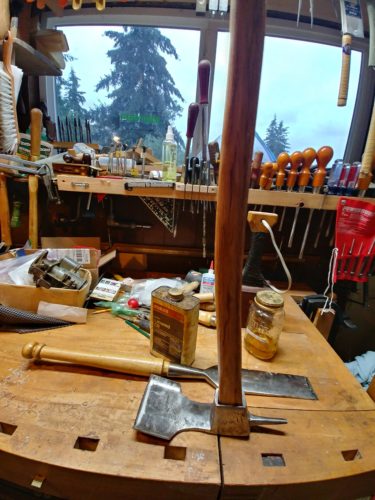
This one has been de-patinated to a high shine (which is a bit of a pity as now she’ll rust without paint; still, it did allow me to read the maker’s stamps), and honed to a fare-thee-well. Today’s pleasant tasks involved commissioning it for use.
After breaking my back three times in four places, I won’t be putting many hard miles on this tool. Still, one doesn’t want to half-ass the tool collection. If it’s to hang in my shop or shed, it has to work when I pull it off the peg. So today’s pleasant tasks included preparing a well-time-traveled icon that was forged from American history.
Following a medical appointment for lung testing (turns out I’m still breathing pretty well, a less-expected blessing than you might imagine, given COPD and a punctured lung), I dropped into Hardwick & Sons in the U District. It’s the only place in King County that consistently stocks correct, square-eyed, perfectly curved hickory handles for antique, two-handed adzes.
Also found a lovely little straight-handled, brass-backed saw with kitten-fine teeth…for only five bucks! I’ll find a use for it, but I don’t know if I’ll ever figure out how properly to sharpen the little jewel.
In about a year, Hardwick’s will be gone from Washington forever and I’ll spend the rest of my sputtering productivity pining for the place where I could once find most of what I needed – and nearly everything I didn’t know I wanted. It’s staffed by the most unkempt collection of counter-corporate tool rats imaginable. They’re my friends, and I’m lucky to know them. Also, they had a packet of the specialty batteries required by our home alarm system, so there’s that.
On the way home, I got to talk with Mom. No big deal, right? Only once you’ve lost more than a couple of your chronological contemporaries, the continuing presence of parents in your life starts to feel like a pretty tremendous blessing.
New handles need breaking in. You can do it with your hands at the cost of weeks of blisters, or do it right with a few minutes’ investment of time. With the handle’s ends pinched between purpleheart dogs on my hand tool bench, I pulled out a card scraper and set to ribboning off the layer of shiny shellac that was sprayed on at the handle works. Why they do this, I’ve no idea. Maybe it stabilizes the wood for shipping, but it will pull your palm skin off in a hurry if not removed prior to swinging in earnest.
The workbench is another fine blessing in my life. Bought near the end of a dying marriage, before I had the confidence to build my own bench or make a hard decision, my Diefenbach “Great American” with double tail vises and two rows of dog holes makes me happy every time I use it, so I use it a lot. And while its purchase surely didn’t reinforce the durability of that relationship, at least it worked as a solid sleeping platform for a few days while I updated my residential plans. Today, it’s the consistent locus of projects that make this house work, which helps this family work, and it’s happily become not mine anymore. It’s ours.
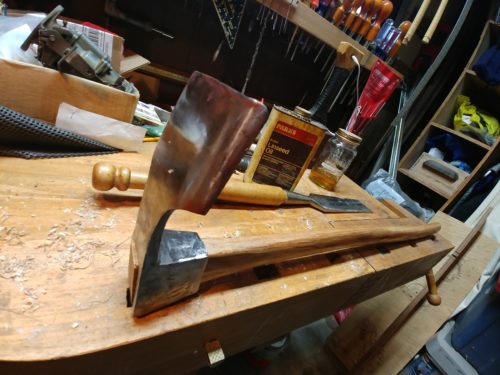
The handle quickly cleaned up, smooth and matte – no sanding required, so no dust produced. I dropped the head into place and rapped it against the floor before marking around it with a short, rosewood-handled scribe awl, gifted to me years ago by my lovely aunt.
Pulling the head back off, I set the handle into a bench hook and reached up for the rattan handle of my dozuki. This saw, delicate and unusual as a trillium, requires care in handling if you don’t want it to shed teeth like an Oilers goalie. Yet, lubricated with a tiny schmear of camellia oil, it slashed the surplus end off my adze handle like an orca munching seals. What feels like luck to me? Reaching over my head to find the perfect tool. Once cut, the end felt as smooth as if I’d sanded it to 120 grit. I’ll need to pick up a backup dozuki (and another little bottle of camellia oil) before Hardwick’s vanishes into memory.
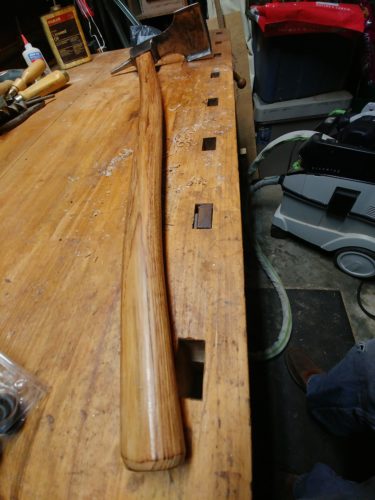
It was time to wipe the swooping shaft down with a little boiled linseed oil. While it dried, I repaired to the utility bench where my grinders are ranked, dress-right dress. I touched up the edge and evened it slightly with the white wheels on my half-speed grinder, then quickly knocked off the burr against a cloth buffing wheel. One grinder was a gift from a friend; another was Dad’s old busted one, rebuilt; the slow-speeder was 40 percent off on sale. That end of the bench is a line-up of friendship and good fortune, two things that go together like butter and garlic.
When I work at the grinders, I don a pair of round-lensed, industrial safety glasses with steel mesh side cups and cable temples. Around a century old, the frames (and their freshly ground, polycarbonate, prescription safety lenses) were a gift from my sweetheart. Like my magnificent Swan slick, Great Uncle Fred’s beech-bodied plough plane, and this shiny new antique adze, those specs are as effective as the day they were made.
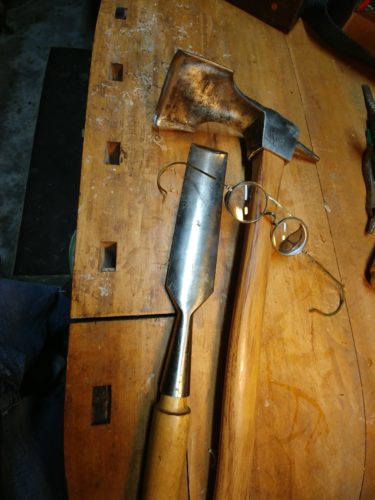
After that, there was nothing left to do but reset the freshly honed head, hold it up in the light, and admire my good fortune.
Someday, I’ll probably paint the head. In the meantime, I’m going to enjoy having a special, old-timey tool that works better than the new version that I can’t afford. Maybe it’ll inspire a project I wouldn’t have taken on without it. Maybe I’ll just haul it out occasionally to be admired by shop visitors. Maybe I’ll bury it firmly in my left big toe, though I sincerely hope not.
It’s a helluva thing, imposing and beautifully balanced, and all I’ve got invested in it is about twelve bucks, a shop full of supporting equipment, and years of friendship.
No better bargain could be forged.

 "Jack Lewis takes the overall literary crown with his new book...there’s a lot more to Lewis’s work than what it feels like to ride motorcycles.” — Ultimate Motorcycling
"Jack Lewis takes the overall literary crown with his new book...there’s a lot more to Lewis’s work than what it feels like to ride motorcycles.” — Ultimate Motorcycling
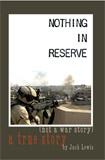 "Insightful and from the heart ... a driven and much recommended look into the mind and conflict of the next generation of war veterans. " — Midwest Book Review (Reviewer's Choice)
"Insightful and from the heart ... a driven and much recommended look into the mind and conflict of the next generation of war veterans. " — Midwest Book Review (Reviewer's Choice)
I like it when you do this.
Nicely written, sir. I share your love of fine woodworking tools, although my collections is not nearly as large. For an example of that adze in ship building action, check out this segment from the Acorn To Arabella channel on YouTube starting at about 11:30. But be warned: These guys are down to earth, hard working young adults with a dream to sail around the world in a boat they built. Their story will likely suck you in if you like dreamers and wood working 🙂 https://www.youtube.com/watch?v=Uja3lGJLHpk
It makes me happy to read of your good fortune.
Glad you’re getting things right. I went back to working on motorcycles (as a hobby) after Vietnam. It’s nice to do something you can control and have a completion. Both are important when you’re getting over the whirlwind.
At any price it is worth the look of astonished glee on your face – – however, my bargain fu is also strong!
Bonus: saved it from getting sagged into a scrap heap because silly people don’t know good tools.